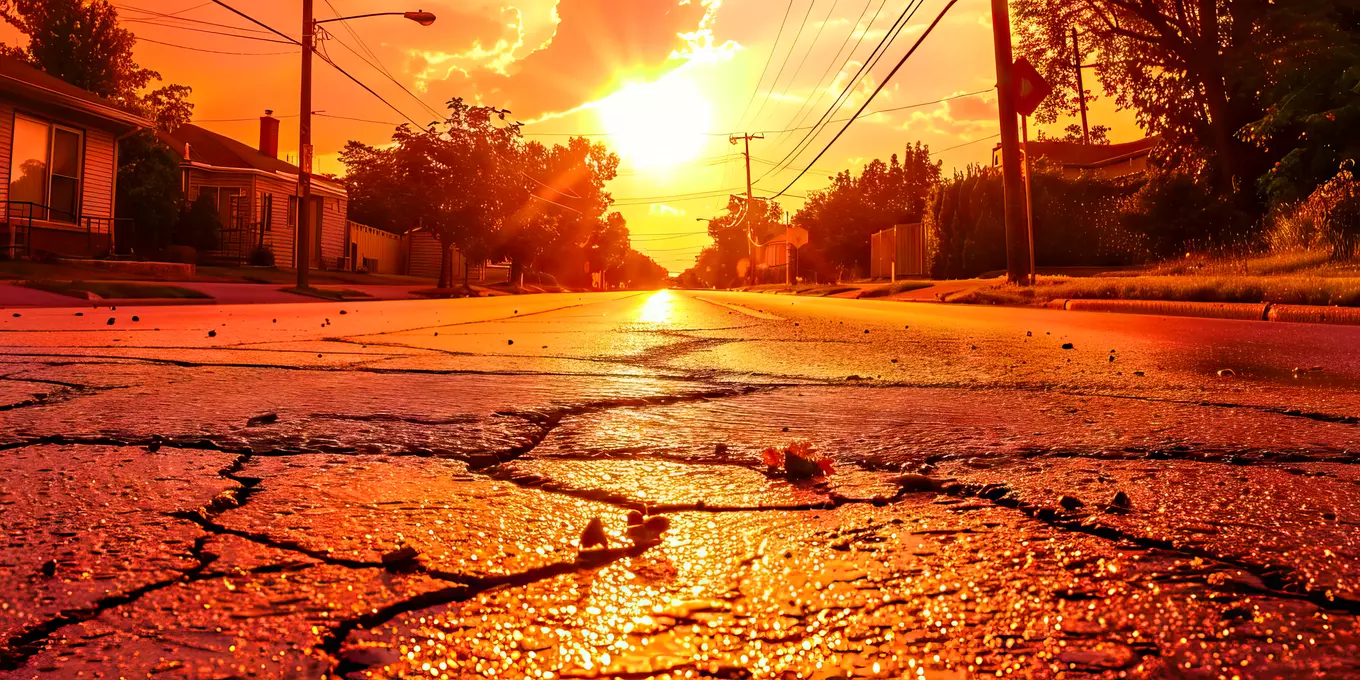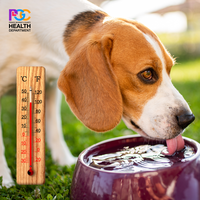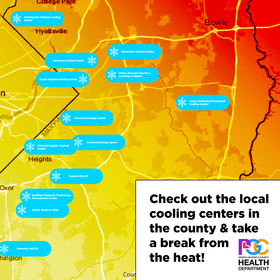

Tips to Beat the Heat
When summer temperatures in the County are very hot, The National Weather Service might issue warnings. This can be risky for our health, especially with temperatures in the 90s with humidity over 50%. When heat advisories are issued, we need to be extra careful to avoid getting sick from the heat.
Prince George's County Cooling Centers
Prince George’s County has set up cooling centers to provide residents with a safe place to escape the heat. These centers are equipped with air conditioning and water, offering relief for those without access to cool environments.
During extreme heat, the County may open cooling stations. These are cool and safe places where everyone, including senior citizens, can go to escape the high temperatures. Dr. Mathew Levy, the Prince George's County Health Officer, recommends that seniors use these cooling centers, especially if they don't have air conditioning at home. To find the nearest cooling center, visit our Cooling Centers Locator.
How to Stay Cool at Home
- Check on relatives and friends, especially the elderly
- Increase time spent in air-conditioned environments like libraries, malls, and movie theaters
- Eat smaller meals, more often
- Take cool baths
- Make sure pets have access to water and shade
Heat Safety Tips
Follow these tips to protect yourself and your loved ones in extreme heat:
- Don't leave kids or pets in hot cars, even with cracked windows.
- If you work outside, be careful in the heat. Take breaks, drink water, and avoid heavy work between 10 a.m. and 3 p.m.
- If you're outside, wear light clothes, a hat, and sunscreen.
- Take breaks in the shade and drink lots of water.
- If you experience a medical emergency, dial 911 or visit a local emergency room. Be prepared.
- Stay informed about the weather, and prepare to care for yourself and your family when serious conditions are expected.
- If necessary, stay out of the heat by going to a cooling center or any place with air conditioning.
Stay Hydrated
With high temperatures, staying hydrated is crucial. Residents are encouraged to drink plenty of water throughout the day. Avoid sugary drinks and alcohol, which can lead to dehydration. Carry a water bottle with you and make it a habit to take regular sips, even if you don't feel thirsty.
Limit Outdoor Activities
To minimize the risk of heat-related illnesses, limit outdoor activities during the hottest parts of the day, typically between 10:00 AM and 4:00 PM. If you need to be outside, wear lightweight, loose-fitting clothing, and take frequent breaks in the shade or a cool environment.
Look Out for Vulnerable Populations
Check on elderly neighbors, young children, and individuals with chronic illnesses, as they are more susceptible to the effects of extreme heat. Ensure they have access to cool environments and are staying hydrated.

Help for Seniors
If you're a senior citizen or have family members who are, you can call the Prince George's County Department of Family Services Administration on Aging at 301-265-8450 for information and help.
Protect Your Pets
Don’t forget about your furry friends! Ensure pets have plenty of fresh water and shade. Never leave them in a parked car, even for a short period, as temperatures inside vehicles can rise rapidly, leading to fatal conditions.
Watch for Heat-Related Illnesses
It's essential to recognize the signs of heat-related illnesses, such as heat exhaustion and heat stroke. Symptoms of heat exhaustion include heavy sweating, weakness, dizziness, nausea, and fainting. Heat stroke, a more severe condition, can cause high body temperatures, confusion, and unconsciousness. If you or someone else exhibits these symptoms, seek medical attention immediately.
When it's too hot, anyone can get sick from the heat. Our bodies need to cool down properly; if they can't, we might face serious health issues like heat stroke and heat exhaustion.
Heat Stroke
This is the most severe heat-related illness. When the body can't control its temperature and goes above 105 degrees, it can lead to symptoms like red and dry skin, confusion, and nausea. It's very serious and needs quick attention.
Heat Exhaustion
This is a milder form of heat sickness that can happen after being in the heat for several days. Symptoms include muscle cramps, dizziness, weakness, and headaches.
Who's at Risk?
Kids, older adults, and people with heart or lung problems are more likely to get sick from the heat. Even when it's not super hot outside, cars can become dangerously hot very fast.
Stay Informed
Keep up-to-date with the latest weather forecasts and heat advisories through local news outlets and the Prince George’s County Health Department’s social media channels. Taking these precautions seriously can help prevent heat-related emergencies and keep our community safe.
For more information on staying safe in the heat, check out resources like The Centers for Disease Control and Prevention. Let's take care of ourselves and each other when it's hot outside!

